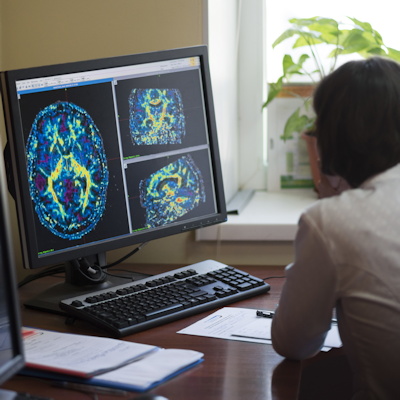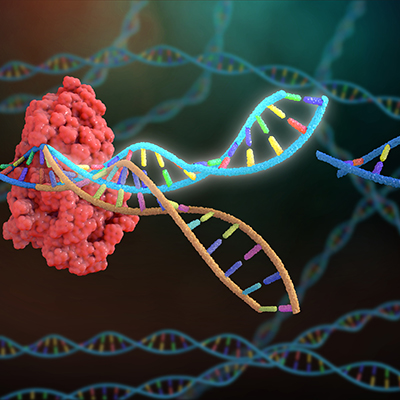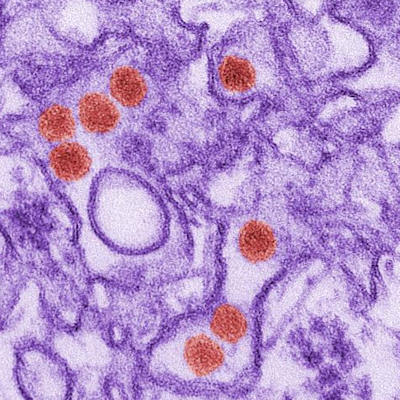 CRISPR-Cas9 screen uncovers chance to repurpose drugs to treat sickle cell disease
CRISPR-Cas9 screen uncovers chance to repurpose drugs to treat sickle cell disease
A CRISPR-Cas9 screen has generated insights into the switch from fetal to adult hemoglobin that suggest a new approach for treating beta hemoglobinopathies such as sickle cell disease. Read More
 CRISPR-Cas9 variant enables DNA cutting at ‘practically any sequence’
CRISPR-Cas9 variant enables DNA cutting at ‘practically any sequence’
Massachusetts General Hospital researchers have engineered a CRISPR-Cas9 variant that overcomes a previous restriction on the locations that DNA can be cut in the laboratory, suggesting molecular cloning approaches can be simplified. Read More
 Mechanistic link between mutation, brain cancer opens up R&D opportunities
Mechanistic link between mutation, brain cancer opens up R&D opportunities
Researchers have identified the mechanisms that mean people with a single nucleotide polymorphism have an increased risk of a subtype of brain tumors. Read More
 Spherical nucleic acids 'dramatically' expand CRISPR delivery options
Spherical nucleic acids 'dramatically' expand CRISPR delivery options
Researchers at Northwestern University contend that by combining nanostructures called spherical nucleic acids with CRISPR-Cas9 systems, the types of cells and tissues that the gene-editing machinery can be delivered to may be "dramatically" expanded. Read More
 CRISPR edited rat embryos reveal cause of rare pediatric neurodegenerative disease
CRISPR edited rat embryos reveal cause of rare pediatric neurodegenerative disease
Using CRISPR gene editing technology on rat embryos, University of Wisconsin-Madison researchers have revealed the mutation that is responsible for progressive gait abnormalities and other symptoms in human infants and young children with a rare neurodegenerative disease. Read More
 New AI tool discovers mutations linking bladder cancer to tobacco smoking
New AI tool discovers mutations linking bladder cancer to tobacco smoking
Using a new artificial intelligence (AI) tool, University of California, San Diego researchers contend they have for the first time uncovered a pattern of DNA mutations that links bladder cancer to tobacco smoking. Read More
 Mutated mitochondrial microprotein linked to increased risk of Alzheimer’s
Mutated mitochondrial microprotein linked to increased risk of Alzheimer’s
University of Southern California researchers have linked a mitochondrial DNA variant to increased risk of Alzheimer’s disease, pointing to a new way to tackle the hard-to-treat condition. Read More
 Researchers further understanding of how circadian clock helps brain recover after injury
Researchers further understanding of how circadian clock helps brain recover after injury
Children’s National Hospital researchers have found that a relatively newly discovered type of brain cell -- known as NG2-glia -- also follows a circadian rhythm, findings that potentially open new paths of investigation for the development of future traumatic brain injury therapies. Read More
 Single-cell sequencing reveals spatial map of immune cells in early-stage lung cancer
Single-cell sequencing reveals spatial map of immune cells in early-stage lung cancer
Using single-cell sequencing, researchers at the University of Texas MD Anderson Cancer Center have revealed a spatial map of tumor-infiltrating B cells and plasma cells that are prevalent in early-stage lung cancers, providing a basis for finding new immunotherapy targets. Read More
 Genomics profiling reveals how Zika infects immune cells, suggests antiviral target
Genomics profiling reveals how Zika infects immune cells, suggests antiviral target
A genomics profiling method has revealed how the Zika virus infects human dendritic cells, pointing to a potential target for therapeutic suppression of the pathogen. Read More
Conferences
Science Briefs
Member Rewards
Earn points for contributing to market research. Redeem your points for merchandise, travel, or even to help your favorite charity.
Research Topics
Interact with an engaged, global community of your peers who come together to discuss their work and opportunities.
Connect
Tweets by @ScienceBoard






